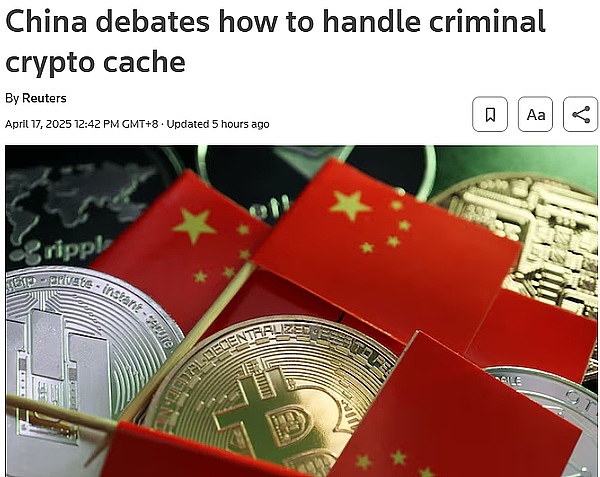In an article published on April 17, "China debates how to handle criminal crypto cache", Reuters discussed China's current judicial handling of cryptocurrency/virtual currency.

(Image from Reuters official website)
Reuters is the largest news agency in the UK and one of the four largest news agencies in the world. However, its official website cannot be directly accessed on the Internet in mainland China.
1. What the Reuters article says
In the article "China debates how to handle criminal crypto cache", the author outlines the current status of judicial disposal of virtual currencies involved in cases in China, expounds on the views of various parties in theory and practice, and also cites a technology company called "Jiafenxiang" in Shenzhen, which helped the mainland cities of "Xuzhou, Hua'an and Taizhou" to dispose of nearly 3 billion yuan of virtual currencies involved in the case. The article mentioned that according to the estimation of Bitcoin investment company River, local governments at all levels in China will hold a total of about 15,000 Bitcoins by the end of 2024.
For the future judicial disposal model, the CEO of Hong Kong HashKey Exchange and the general manager of China Investment Corporation and others said that the central government should centrally handle it in the future; some lawyers also said that the People's Bank of China should be responsible for disposal.
There are still some parts in the Reuters article that are inconsistent with the actual situation in China. For example, the Reuters article said: "Crypto trading is banned in China", which is actually inconsistent with the actual situation. Whether in terms of policy regulations or in practice, virtual currency trading is not currently prohibited in mainland China.
For example, in the "Notice on Further Preventing and Dealing with the Risks of Virtual Currency Trading Speculation" (hereinafter referred to as the "9.24 Notice") jointly issued by ten national ministries on September 15, 2021, only one suggestive provision was stipulated: "There are legal risks in participating in virtual currency investment and trading activities. Any legal person, non-legal person organization or natural person who invests in virtual currency and related derivatives and violates public order and good morals shall have the relevant civil legal acts invalid, and the losses caused thereby shall be borne by themselves..." Translated into plain language, it means that citizens can invest in virtual currency, but at their own risk, and civil law will not protect them (but if it involves criminal cases, criminal law will intervene); in practice, there are a large number of U-merchants in mainland China who are engaged in the exchange of virtual currency and legal currency. Except for a few who have been criminally held accountable (mainly suspected of money laundering), the vast majority have not been criminally cracked down.

II. Compliance of Judicial Disposal of Virtual Currency Involved in Cases in China
In fact, as BitJungle said in the Reuters article, the current judicial disposal of virtual currency involved in cases can already achieve full compliance. But what is more helpless is that many local governments still don’t know what is truly compliant disposal.
As a web3 criminal defense lawyer, the author has found a large number of illegal disposals of virtual currency involved in cases represented by himself or represented by friends and colleagues (such as direct disposal and realization of virtual currency involved in the country, and the disposal funds are directly paid from domestic personal bank cards to fiscal accounts). The main reason is that some grassroots judicial organs do not really understand what is compliant disposal, and part of the reason is the possible transfer of interests.
Based on the "9.24 Notice" prohibiting mainland Chinese entities from engaging in "exchange business of legal currency and virtual currency" and "virtual currency exchanges to expand business to the mainland", at present, whether it is mainland judicial organs or commercial entities or individuals, they are indeed not allowed to engage in the above-mentioned illegal financial activities. However, if the judicial organs entrust a third-party disposal company, and the third-party disposal company entrusts overseas entities to dispose of and realize on a platform that complies with local overseas supervision, and the disposal funds then enter the country through legal and compliant channels, it does not violate the current mainland regulatory regulations on virtual currency.
In some currency-related cases where the amount involved (RMB) must be ascertained, the disposal of the virtual currency involved (even the need to dispose of the virtual currency before the case is judged) has become a necessary step. At this time, the urgency of case practice does not allow the state to issue unified regulations after waiting for various experts to discuss; and according to the "Procedures for the Public Security Organs to Handle Criminal Cases" and "Several Provisions on the Management of Property Involved in Cases by Public Security Organs" and other departmental regulations, the public security organs do have the power to dispose of the property involved in the case in advance.
Third, will judicial disposal be centralized in the future?
Since China is a continental legal system country, the unified code plus the authoritarianism in the Chinese legal system will more or less make the Chinese people have the concept of "legal unification". In the field of judicial disposal, the author understands some people's proposal that the state should set up unified disposal rules and disposal agencies to carry out national disposal, so as to prevent the inconsistency and even chaos of local judicial organs in the disposal of virtual currencies involved in the case.
But it is still difficult at present. The main reason is the tension between local finances and superiors or even central finances. The author will not elaborate on the details. The conclusion is that it is difficult for the state to centrally handle judicial disposal in the short term. In addition, my country will not directly nationalize virtual currencies (especially Bitcoin) seized and confiscated by judicial organs and establish national reserves like the United States in the short term.

Fourth, Conclusion
In simple terms, the judicial disposal of virtual currency is not a scourge. It is just the disposal of property involved in judicial activities in the mainland. It just happens to be virtual currency. Virtual currency is strictly regulated in mainland China. Although it is not prohibited to trade, the country does not allow any third party to provide any services for virtual currency transactions in the mainland. Therefore, the current domestic + overseas joint disposal model has been derived. If the "9.24 Notice" is modified or abolished one day, allowing virtual currency transactions in the mainland, the judicial disposal of virtual currency will be exactly the same as the judicial disposal of equity, houses, and vehicles.
 Joy
Joy






